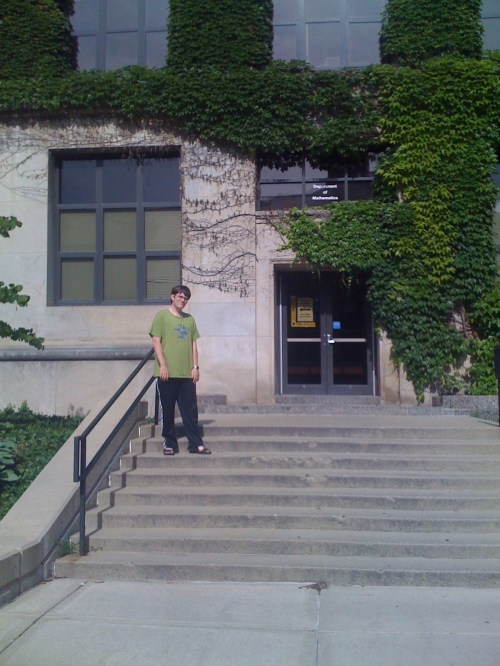
anXiety, pen and ink on graph paper, doodle © 2008 by ybonesy. All rights reserved.
I want to write about anxiety. Not panic attacks, since I don’t think I’ve ever had one of those, but rather, the general sense of dread that covers me at times like a veil.
I want to write about anxiety, but not in a medical way. I want to write about the days I feel like I can’t possibly smile, can’t possibly let myself get into a good mood, so shellacked into place is my heart that if I allow myself to feel it pulsing in my chest I might just burst open.
I catch myself increasingly more in this predicament, anxious and paralyzed and becoming the impatient, often enraged woman I knew as…my mother.
Yes, my mother! She suffered anxiety for many years, and there is indication that, like brown hair or Diabetes, anxiety runs in families. As one article put it, “More often than not, anxious women grew up in anxious households.”



Mom must have been in a near constant state of anxiety. There was a 13-year spread between me—the youngest—and my oldest sibling, which means Mom was living and breathing children from the moment Patty was born until I moved out at age 18. That was 31 years of dealing with kids through every stage, and it doesn’t include my niece, who was six years younger than me and who Mom eventually brought into the fold.
I tell the story of being five years old and walking into my house one day after having spent a few hours across the street with my best friend at her grandmother’s trailer. My eyes were lined in black; we’d gotten into Suzanne’s grandma’s make-up bag. I came in through the back door just as Mom was getting up from a nap. Usually she made me take naps with her but this day I got to play with Suzanne instead.
I can see Mom now, making her way to the kitchen to find her cigarettes and maybe a glass of iced tea. I am happy and proud; it’s the first time I’ve put on make-up, the domain of grown-up women. Mom crosses the living room, I’m coming up through the den. She sees me and I am smiling, about to open my mouth and tell her “Look what we did!” but before I can get out the words she raises her arm. WHACK! In a throaty voice she screams, “COCHINA!” “PIG!”



Later on, when I started school and life became more intense for Mom, it was hard to separate her meanness from her Meniere’s Disease. When I think of her during those times I see her in bed or on the bathroom floor or the couch, a wet washrag on her forehead and a glass of water by her side.
I remember one summer we drove to Juárez, pulled into the parking lot of the Camino Rael Hotel. Its pink stucco and turquoise swimming pool shimmered like a mirage just beyond the asphalt, and there went Mom, puking into a brown paper sack. The long road trip with three of us fighting in the back of the Caprice, plus the heat, set off an attack.
Always sick, always throwing out certain expressions: “I can’t stand you!” “You kids are driving me crazy!” “I’m a nervous wreck!” There were good memories, too, a flood of goodness, and I don’t want to make my mother sound like a monster. She wasn’t by any means. I’m just trying to understand the cycles of anxiety, what they transform us into, and how I might break the pattern.
Which reminds me, my youngest jokingly calls me Momster. Am I?
If not, I suspect I am on the road to becoming one. Like it did for Mom, my life seems to be getting out of hand. At times my emotions, even my physical being, are hijacked by anxiety.
I sometimes find myself driving in my car and thinking, I shouldn’t have become a mother, I shouldn’t have become a mother, and then I retract it all, convinced that God will punish me by taking away my daughters. This is anxiety talking, taunting in its urgent whisper, That’ll show you.




My friend Deborah calls it “middle-aged rage,” and maybe she’s talking about something different but I tend to think it’s just anxiety in its angry incarnation. Deborah says it stems from the pressure to be good – good mother, good employee, good partner. She also says it’s the mountain of responsibility that piles up daily – bills to pay, deadlines to meet, cans and bottles and paper to recycle.
“Passions unmet,” I chime in, giving away that for me the crux of the matter is almost always this balance between being the solid matriarch of my family and being myself. Artist, writer, and individual.
 I do agree that middle-aged rage is a symptom of our inflated expectations. Disappointments taken to the nth degree. The bald realization that we’re not perfect. We’re smart women. We may or may not hold down well-paying jobs. We might be great gardeners, mostly solid friends. Our parents need us more than ever and we’re struggling to meet those needs, never mind looking and feeling good and meeting the pressures of being decent role models.
I do agree that middle-aged rage is a symptom of our inflated expectations. Disappointments taken to the nth degree. The bald realization that we’re not perfect. We’re smart women. We may or may not hold down well-paying jobs. We might be great gardeners, mostly solid friends. Our parents need us more than ever and we’re struggling to meet those needs, never mind looking and feeling good and meeting the pressures of being decent role models.
For me it’s gotten worse in the past year. It’s the perfect storm. Daughter in mid-school with those funky dynamics, another in elementary (and I can always find something to worry about in her life – too skinny, too sickly, too talky). Aging parents, stressful career, big house, new dog. You name it, I got it.
 Anxiety becomes worse as women take the long walk toward menopause, and I seem to have been stuck on that trail for years now. Given the physical changes in my body (temperature changes, night sweats, weight) I think I’m heading deeper into the forest, but I wish this body of mine would just squeeze through the eye of the needle and emerge, with all the apparent downsides, into the desert of post-menopause. I will give up any day the last of my so-called youth for that long moment of calm.
Anxiety becomes worse as women take the long walk toward menopause, and I seem to have been stuck on that trail for years now. Given the physical changes in my body (temperature changes, night sweats, weight) I think I’m heading deeper into the forest, but I wish this body of mine would just squeeze through the eye of the needle and emerge, with all the apparent downsides, into the desert of post-menopause. I will give up any day the last of my so-called youth for that long moment of calm.
I tell Deborah that we were stupid to wait until our mid-to-late 30s (her, early 40s) to have children, but she reminds me we would have simply had longer periods of rage and be less equipped to cope. I suppose she’s right.
 I feel fortunate that she’s opened up this conversation. Over this past year I’ve felt the anxiety growing like yeast in my belly, yet I’ve kept a lid on it. But once I get something out in the open, exposed to air and light, there’s no hiding from it. I will talk, write, treat it to its pretty death. My submission will lead to its submission.
I feel fortunate that she’s opened up this conversation. Over this past year I’ve felt the anxiety growing like yeast in my belly, yet I’ve kept a lid on it. But once I get something out in the open, exposed to air and light, there’s no hiding from it. I will talk, write, treat it to its pretty death. My submission will lead to its submission.
My annual check-up is coming up this fall, none too soon to get the medical help I need to get my calm back. Mean time, I’m exercising, cutting out the crap I’ve been eating, setting boundaries, and holding on tightly to daily practice and prayer.
The girls still tell me I’m a nice mom. But I tell you, it’s a thin thread that holds me to that reality versus being Momster 24/7.
Read Full Post »






















































